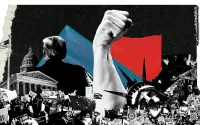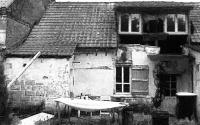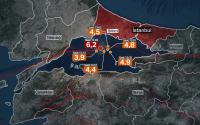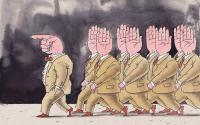13 June 2005
The Lebanese went to the elections yesterday as if it was a festival, all music and flags and picnics on the grass opposite the polling booths. The Christian and the Muslim and the Druze of Lebanon lay down with their appropriate tigers. The first free elections in 30 years.
The Mediterranean, far down the mountainside, lay pale green in the evening light. Liberty. The Syrians have gone. But have they? The Mediterranean looks suddenly darker. The intelligence war that has so often smothered Beirut is closing in again.
How war closets this country, bastes it in the oven of history, ensures that the smallest constituency maintains the integrity of the civil war that ended 15 years ago, a conflict in which the Syrians were deeply involved.
I only have to visit a few friends to hear the worst. The Syrians are back. An odd colonel or two, a general here and there, from the intelligence services, of course. True? And, if so, why?
The UN confirmed the withdrawal of all Syrian troops and intelligence officers scarcely a month ago. Now the UN secretary general, Kofi Annan, threatens to send his "verification" team back to reconfirm. There are names: Khalouf, Safeitly, Jabour, Ghazaleh ... Syrian intelligence officers. Ghazaleh was the former head of Syrian military intelligence in Lebanon.
Or maybe he still is? If the Syrians have returned - out through the door, back through the window, as the Lebanese say - what might they do with the sectarian pot that constitutes all of Lebanon's tragedies?
Travel through the mountains of Lebanon yesterday and the Druze-Christian war comes back like a tempest. In the village of Kfar Matta - of which more later - the Christians cannot even vote alongside their Druze neighbours, because they killed too many of them in 1983.
The Druze, who lost 270 in a 1983 massacre - which also killed a friend, Clark Todd, a Canadian television correspondent - vote enthusiastically in a school in the centre of their still partly-ruined village. Lebanese soldiers guard them. The Christians of Kfar Matta, however, have to go elsewhere to exercise their democratic vote.
But the Syrians, that's the thing. Are they back? Alas, they probably are. A dark cloud shadows this awesomely beautiful country, just when we all thought it was safe to go back into the green waters of the sea.
The story so far. Rafik Hariri, the former prime minister of Lebanon, was murdered in a bombing in Beirut on 14 February, 2005. Opposition politicians blamed the Syrian regime because - so they said - it believed Hariri was behind UN Security Council Resolution 1559, supported by the United States and France, which demanded the withdrawal of the Syrian army and its intelligence officers from Lebanon.
A million Lebanese rallied to demand the truth about his assassination. A preliminary UN investigation concluded "the government of Syria bears primary responsibility for the political tension that preceded the assassination ..."
But now, according to the Kuwaiti newspaper Al-Siyassa, a CIA investigation into the murder concluded that between six and nine senior Syrian intelligence officers were involved.
The paper names - as "planners and executors" - of the murder, Colonel Mohamed Khalouf, former commander of the Syrian intelligence offices at the Beau Rivage hotel in Beirut, Colonel Jihad Safeitly, head of Syrian "Political Operations" in Lebanon, and Brigadier General Rustum Ghazaleh, former head of Syrian military intelligence in Lebanon.
It claims, too, that a secret CIA/FBI investigation was carried out on the Hariri assassination in Lebanon for four days, starting on 18 February, which concluded that four senior members of the Lebanese security forces knew of plans for the murder before it took place and helped monitor Hariri's movements and select the date of his murder.
One of the paper's sources said a former Lebanese cabinet minister was also involved. The Lebanese are already trying to guess - accurately - his identity.
This is, as they say, a very serious matter. Even graver is the information which Walid Jumblatt, the Druze leader, says he has received of continued Syrian intelligence operations in Lebanon. He has been told that - back in Lebanon after their famous "military withdrawal" - are Mohamed Jabour, a Syrian officer formerly based in the Lebanese town of Sofar, high in the hills above Beirut, and Jamer Jamer, who was a spook in the west Beirut Hamra district, and Said Rabah, a Syrian intelligence man from Hamana (in the valley below Sofar), and that all have returned to Lebanon.
And so has Rustum Ghazaleh, the ex-top intelligence man in the country. All of the above, Syria officially denies.
Mr Jumblatt still believes that he is on a Syrian "hit list" and the Americans are banging the same drum almost every day. "Our message to Syria,'' President George Bush said on Friday " ... is that in order for Lebanon to be free, Syria needs to not only remove its military, but to remove intelligence officers as well."
An anonymous US government spokesman - rather too anonymous for such a comment, perhaps - said the American information came from "a variety of credible Lebanese sources."
The murder of the Lebanese journalist, Samir Kassir, 11 days ago - a writer who was deeply critical of the Syrian Baath party, who had received furious phone calls from Rustum Ghazaleh - was a message to Lebanon: just when you thought it was safe to speak freely, the murderers are still in business.
And how. After Hariri's murder, one of the top pro-Syrian security officials, Lebanese General Haj Ali, removed the burnt- out remains of the Hariri convoy from the scene of the crime.
Other security officials planted false evidence at the scene. Or so said the first UN investigation team.
Now, it turns out - chillingly for those of us who believed that a clean security leadership had been installed in Lebanon - that the car in which Kassir was bombed was also removed from the scene of the crime within hours, allowing the Lebenese cops to "lose" the detonator of the explosives which killed him.
This is no small matter. At the scene, I watched Lebanese military forensic officers take pieces of the bomb from the burnt vehicle after Kassir's assassination, placing them in containers.
But the police moved the car, and the detonator - which is the all-important clue to the culprits - disappeared. How very convenient. Detonators have numbers. These codes can be used to discove the manufacturer and, more importantly, the country to which it was sold.
No wonder the Mediterranean looks suddenly darker. No detonator. No numbers. No culprits. There are glitches, of course.
The intelligence teams sniffing around Hariri's murder are said to be 85 per cent certain of their information about the Syrian intelligence officers but only 15 per cent about the possible involvement in the bombing of Imad Mougnieh, a pro-Iranian Lebanese who is widely regarded as the leader of the hostage-takers who abducted so many Westerners in Lebanon in the 1980s.
He was not, so they claim, in Lebanon before Hariri's killing. Which is interesting.
Mr Mougnieh is linked to the Hizbollah, who the Americans - and, of course, the Israelis - want disarmed. If a Hizbollah connection can be foisted on to Hariri's death, then US demands become ever more powerful.
But Hizbollah had no reason to harm Hariri - whose secret contacts with the Hizbollah leadership have recently been revealed. Are the Americans now bringing politics into the police investigation of Hariri's death?
The danger of all this spookery, of course, is that it is being played out in a fragile, post-war country whose civil war animosities can be reawoken by a single bomb; hence, presumably the five explosions in Christian areas of Lebanon that followed Hariri's murder.
Yesterday's third day of elections - which will decide whether the opposition or the pro-Syrian rump control the next parliament - were, in principle at least, a spirited affair.
Lebanese Christian politicians allied themselves, for votes only of course, with their own former civil war opponents.
Thus in the Christian town of Kahale - a Lebanese Forces bastion in the war - cars were careering through the streets with their occupants waving Hizbollah flags. In the village of Kfar Matta, stranger things were to be observed. In 1983, Christian militiamen - including, tragically, Christians from the same village - embarked on an orgy of killing of their Muslim neighbours. At least 270 men, women and children were butchered.
They included a young Canadian journalist called Clark Todd who was reporting the war.
Fifteen years after the end of that war, the villagers voted for tickets that actually joined former Christian and Druze enemies. It was, some of them claimed, a first step towards a reconciliation. But not yet.
The Lebanese voting system is often described as proportional representation. Actually, it's proportional sectarian - because the voting lists contain candidates selected by their ethnic origins.
And in Kfar Matta, there has been none of the formal "reconciliation" - musallah in Arabic - that must precede any tribal return to a town or village in which one side has committed a crime. So the Christians of Kfar Matta could not vote in their village, from which they have long fled.
Instead, they were given polling stations in the neighbouring village of Mishrif, next to a cul-de-sac which could not lead to their former homes and those of their victims but which was a few metres inside the parish of Kfar Matta - and thus made the polling stations legal.
Rafic Haddad, a young equity analyst who now lives in Paris - far too young to have been involved in the war - had flown all the way from his home in France, his £350 air ticket an expensive way of subsidising democracy - to vote at Mishrif. "One day we'll go back to our town - it will happen, there will be conciliation," he said. And that, remarkably, is what the Druze in Kfar Matta told me, too.
Firas Kaddaj wanted this reconciliation. "We have got to have a new Lebanon now that things have changed," he told me in front of the schoolhouse polling station which the Christians of his village could not visit.
But this is a sensitive, desperately dangerous place, in which optimism flowers amid the bougainvillea while threats lay heavy over the landscape.
On Friday night, I drove up for dinner with Walid Jumblatt in his Druze castle at Mukhtara. There was fine wine and the best salads and the funniest of conversations. But Mr Jumblatt, my favourite - indeed, the only - true nihilist in the Arab world - is looking worried. He thinks he is on a hit list. I fear he is, too. I fear all Lebanon is.
So how to end this report from that soft, gentle, ferocious country of Lebanon?With these words: watch out!






